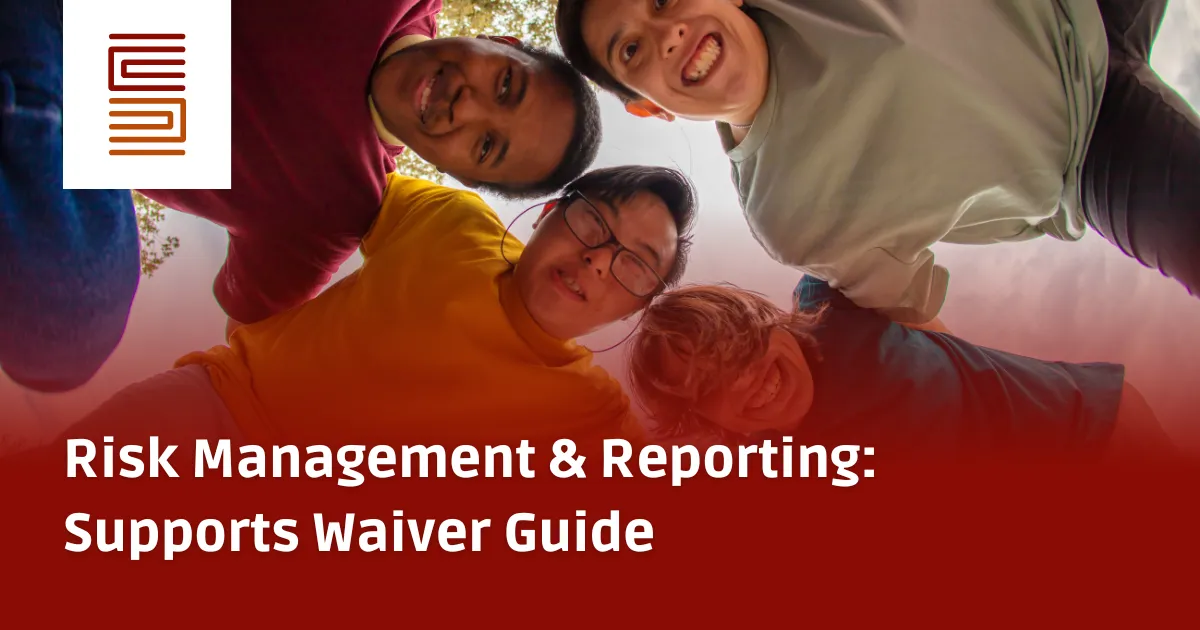Risk Management and Reporting Requirements: A Supports Waiver Guide
Introduction to Risk Management and Reporting
The Supports Waiver Program prioritizes participant safety and well-being by requiring effective risk management and adherence to mandatory reporting requirements. These processes ensure that participants receive care in a safe, supportive environment while holding providers accountable for addressing risks and reporting incidents of abuse, neglect, or exploitation.
This guide outlines how participants and providers can manage risks and comply with mandatory reporting guidelines.
Managing Risks Under the Supports Waiver
Risk management involves proactive strategies to minimize potential hazards and ensure participant safety. Both participants and providers play a role in developing and implementing these strategies.
1. Emergency Planning
- Every Individual Support Plan (ISP) must include an emergency back-up plan to address unforeseen situations, such as provider unavailability or natural disasters.
- Participants work with their Community Support Coordinator (CSC) to identify backup providers and resources that can step in during emergencies.
2. Staff Training
- Providers are required to complete mandatory training to ensure they can identify and respond to risks effectively.
- Training topics include:
- Identifying potential abuse or neglect.
- Addressing medical or behavioral emergencies.
- Implementing person-centered practices to reduce risks.
3. Ongoing Monitoring
- Participants and CSCs regularly review ISPs to ensure risk management strategies remain effective.
- Providers conduct routine evaluations to address emerging risks or changing participant needs.
By prioritizing risk management, participants and providers can create a safer and more supportive care environment.
Mandatory Reporting Requirements
The Supports Waiver Program enforces strict mandatory reporting guidelines to protect participants from abuse, neglect, and exploitation.
What Must Be Reported
Providers are required to report any incidents that:
- Involve physical or emotional abuse.
- Constitute neglect or failure to meet a participant’s needs.
- Suggest financial exploitation, such as misuse of participant funds.
How to Report Incidents
- Immediate Action: Providers must ensure the participant’s safety before submitting a report.
- Use of Established Guidelines: Incidents are reported according to the Supports Waiver’s official reporting procedures.
- Timely Submission: Reports must be filed promptly to enable timely investigations and interventions.
Reporting Resources
- Abuse Reporting Hotlines: Contact state-designated hotlines or agencies to report abuse or neglect.
- CSC and Provider Agencies: Work with CSCs and provider agencies to ensure all incidents are properly documented and reported.
Failure to report incidents can result in penalties and jeopardize the safety of participants.
How the New Mexico Support Network Can Help
The New Mexico Support Network provides critical resources and support to help participants and providers navigate risk management and reporting requirements. Their services include:
- Training Programs: Offering workshops on identifying and managing risks.
- Incident Reporting Support: Assisting providers and participants in filing accurate and timely reports.
- Emergency Planning Assistance: Helping participants develop robust back-up plans for their ISPs.
With the guidance of the New Mexico Support Network, participants and providers can uphold the highest standards of safety and accountability.
The Importance of Risk Management and Reporting
Effective risk management and reporting ensure that:
- Participants Are Protected: From harm, neglect, or exploitation.
- Providers Are Accountable: For delivering safe, high-quality care.
- Issues Are Addressed Promptly: Enabling swift interventions and improved care outcomes.
These practices reinforce the program’s commitment to creating a safe and supportive environment for all participants.
Additional Resources for Risk Management and Reporting
External References
- National Adult Protective Services Association (NAPSA)
- Centers for Medicare and Medicaid Services (CMS)




